Talk to a Registered Dietitian and use INSIDER20 for 20% off!
Talk to a real Dietitian for only $99: Schedule Now
This post contains links through which we may earn a small commission should you make a purchase from a brand. This in no way affects our ability to objectively critique the products and brands we review.
Evidence Based Research To fulfill our commitment to bringing our audience accurate and insightful content, our expert writers and medical reviewers rely on carefully curated research.
Read Our Editorial Policy
The reasons why we eat are complex and multifactorial—ranging from emotions to celebrations to simply feeling hungry.
Although having an appetite is a sign of good health, many people feel they have overstimulated appetites that cause excessive food intake.
Certain herbs, plants, and compounds have been studied for their roles in suppressing appetite, which work by making you feel more full, changing your appetite hormones, or slowing down how fast food empties from your stomach.
However, not all natural appetite suppressants are created equal—some can be dangerous, and some can be simply ineffective.
In this article, learn more about seven compounds or nutrients that may work well to suppress appetite—and which ones to avoid.
As opposed to prescription appetite suppressants, natural appetite suppressants are derived from herbs, plants, or natural ingredients.
Although the research on most is limited, these compounds are commonly found in appetite suppressant supplements or weight loss supplements and may suppress hunger naturally.
Keep in mind that natural appetite suppressants are not always healthier or safer than prescription medications—in fact, they can often be more dangerous because dietary supplements are not monitored or approved by the FDA.
Therefore, take caution when using natural appetite-suppressing supplements and always choose reputable brands that undergo third-party testing.
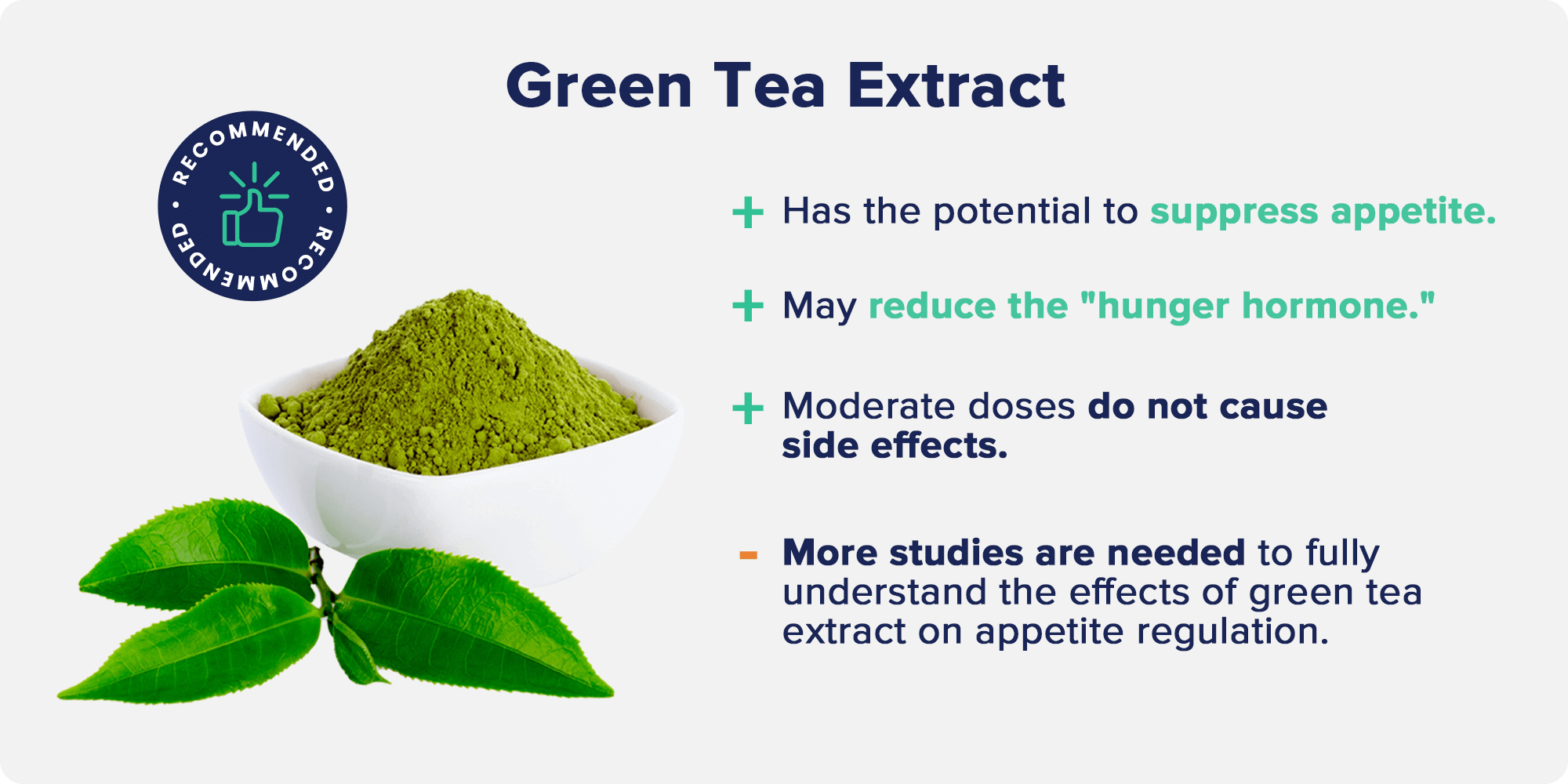
Green tea has been studied for its potential impact on weight loss and appetite suppression.
Some research looks at drinking green tea itself, but supplements typically contain EGCG (epigallocatechin gallate), an antioxidant compound prevalent in green tea.
EGCG and other catechins are likely what produces the potential appetite-suppressing effects.
In a 2016 randomized controlled trial, obese women who took high doses of EGCG (857mg) per day for 12 weeks experienced significant reductions in the hormone ghrelin, which is known as our “hunger hormone.”
Ghrelin plays a significant role in appetite, as it signals to the brain that you’re still hungry, leading to increased energy intake in both lean and obese humans.
Although green tea extract and EGCG have been studied for their role in increasing energy expenditure and supporting weight loss, the research on green tea and appetite suppression is limited.
However, moderate doses of green tea extract are generally considered safe and do not lead to adverse side effects—and green tea as a beverage is even safer.
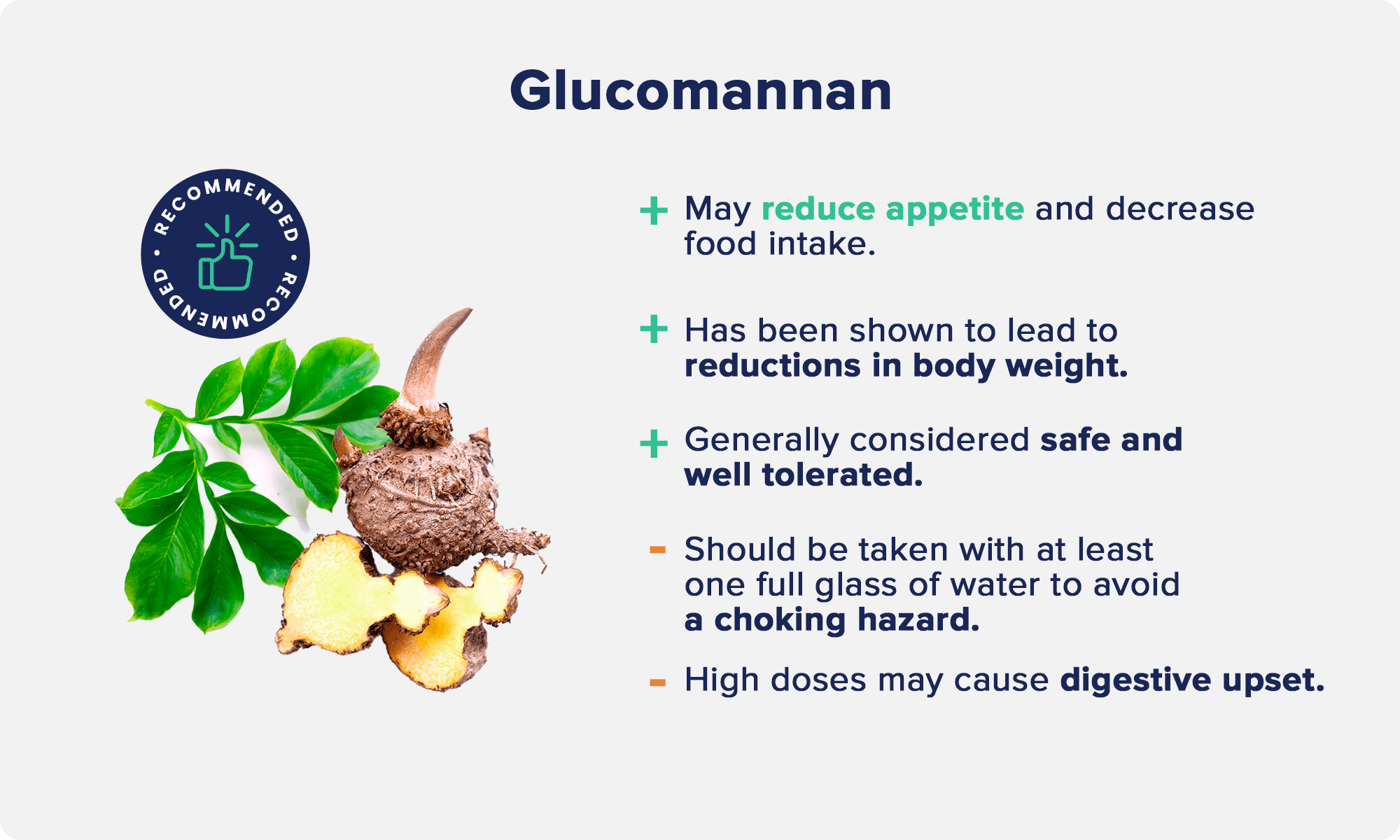
Glucomannan is a type of soluble fiber found in konjac root that can reduce appetite and decrease food intake.
It works by absorbing water—as all soluble fibers do—becoming a viscous gel that bypasses digestion while promoting feelings of fullness.
This water-bulking property also delays stomach emptying, which helps increase satiety and reduce food intake.
In a randomized controlled trial, people with type 2 diabetes who took glucomannan had significant reductions in both fasting and during-meal ghrelin levels, suggesting that it has appetite-suppressing effects.
Plus, in a study of overweight people, those who took 3g of glucomannan (combined with 300mg of calcium carbonate) for two months experienced significant reductions in body weight.
Glucomannan is considered safe and generally well tolerated.
However, it’s imperative to know that it expands rapidly and can be a choking hazard unless taken with at least one full glass of water.
High amounts of glucomannan can also cause digestive upset.
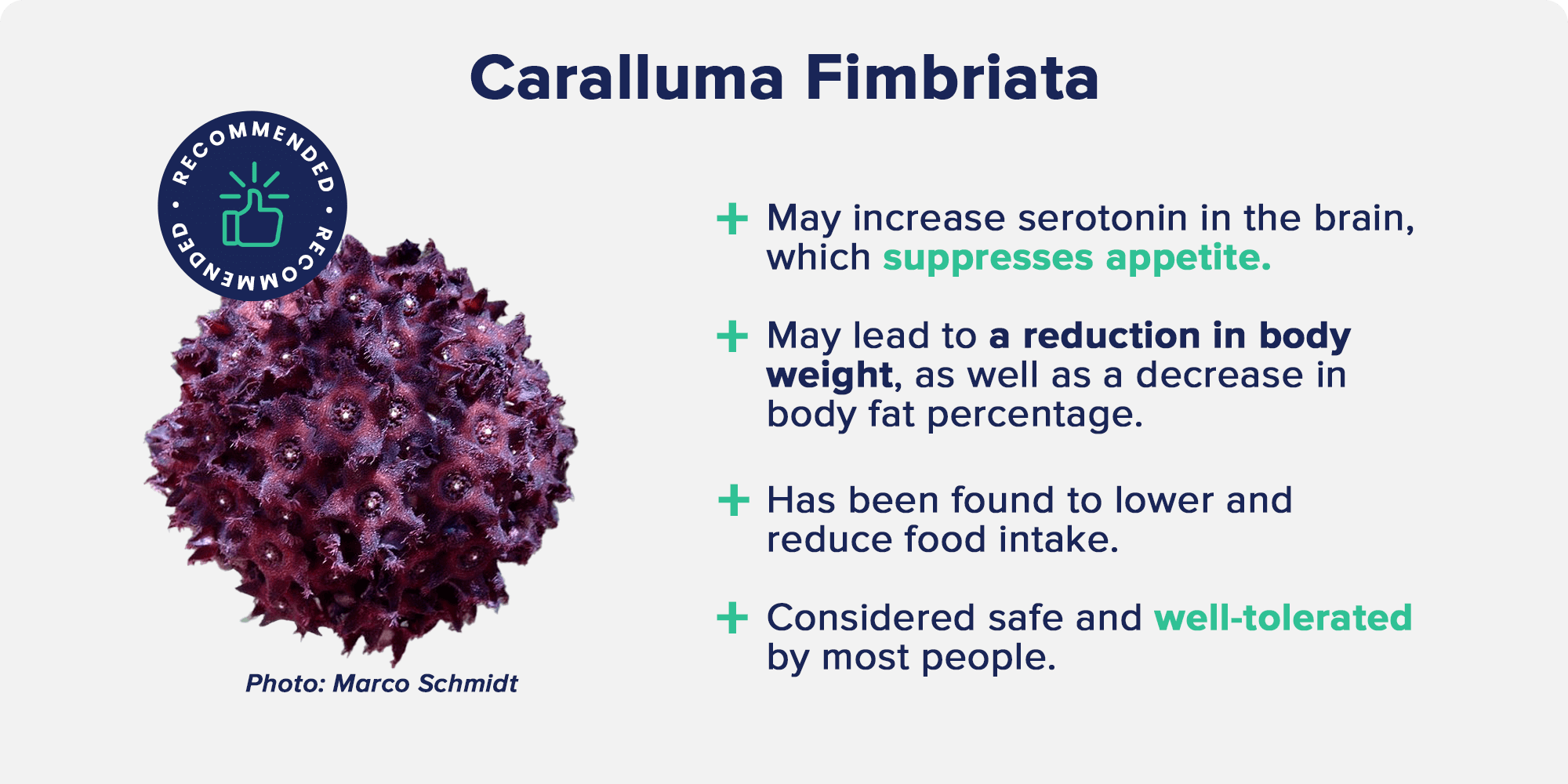
Caralluma fimbriata is an edible cactus from India that has traditionally been used to suppress appetite.
It’s thought that compounds in Caralluma fimbriata increase serotonin in the brain, which has been shown to suppress appetite and reduce carbohydrate intake.
In a trial published in the journal Appetite, overweight adults who took 1g of Caralluma fimbriata for two months had significant reductions in appetite—in addition to a 2.5% reduction in body weight.
Another study looked at people with Prader-Willi syndrome, a condition that leads to overeating.
Those taking the highest dose of Caralluma fimbriata (1000mg daily for four weeks) had significantly lower appetite levels and reduced food intake.
Plus, Caralluma fimbriata is considered safe and has not been found to produce any adverse effects.
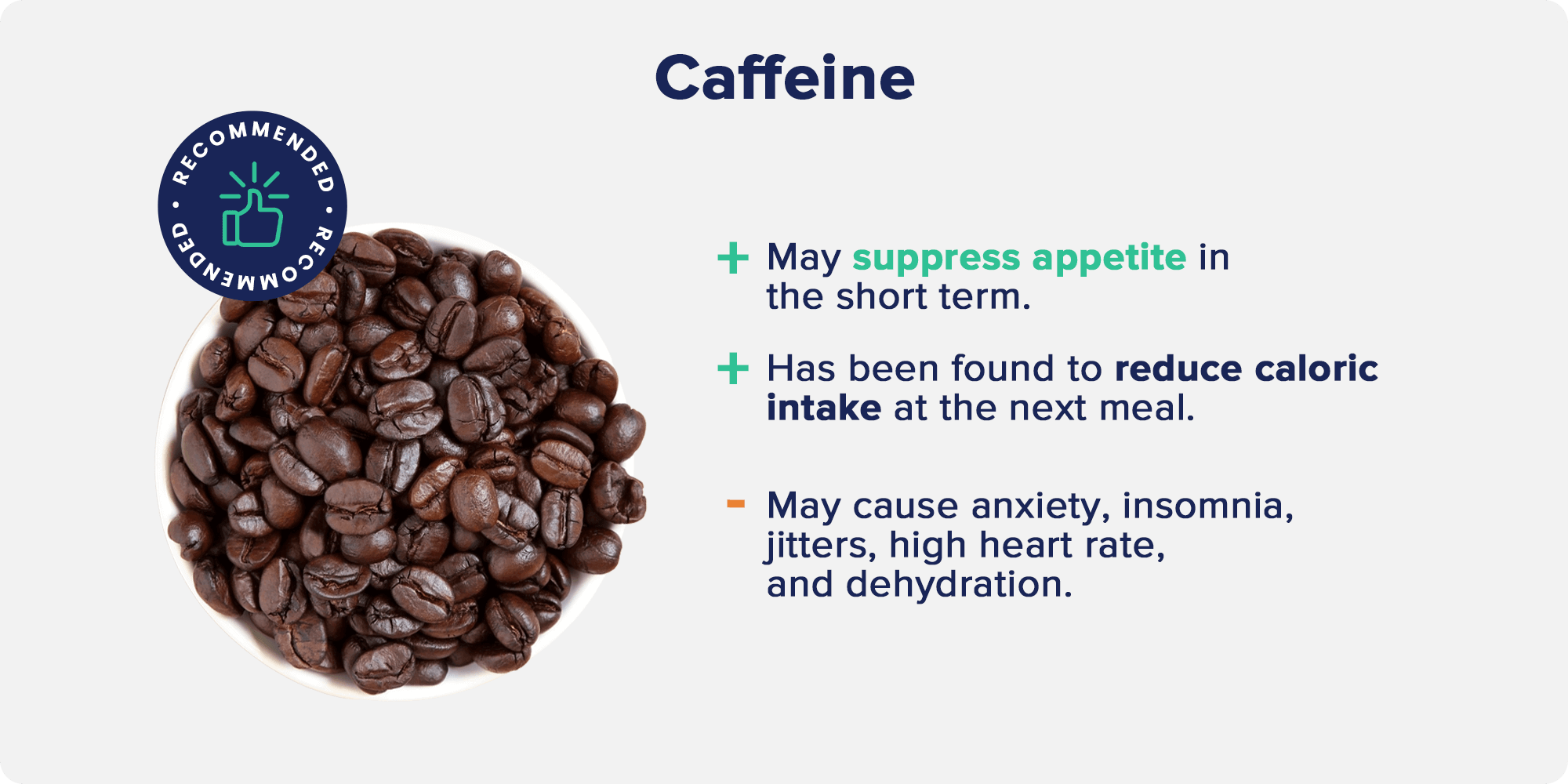
Caffeine is a well-known nervous system stimulant found in coffee, tea, and chocolate—and it can also suppress appetite in the short term.
A review article from 2017 concluded that drinking coffee 0.5-4 hours before eating reduced caloric intake at the next meal.
Another study had healthy adults consume 0, 1, or 3 milligrams of caffeine per kilogram of body weight—for example, a 150-pound person would drink either 0, 68, or ~200mg of caffeine—30 minutes before having access to a breakfast buffet.
The researchers found that total caloric intake was 10% lower only after drinking 1 mg/kg of caffeine—but energy consumption was not affected later in the day or night.
However, the research on caffeine and appetite control is mixed.
Plus, excessive consumption of caffeine can cause anxiety, insomnia, jitters, high heart rate, and dehydration.
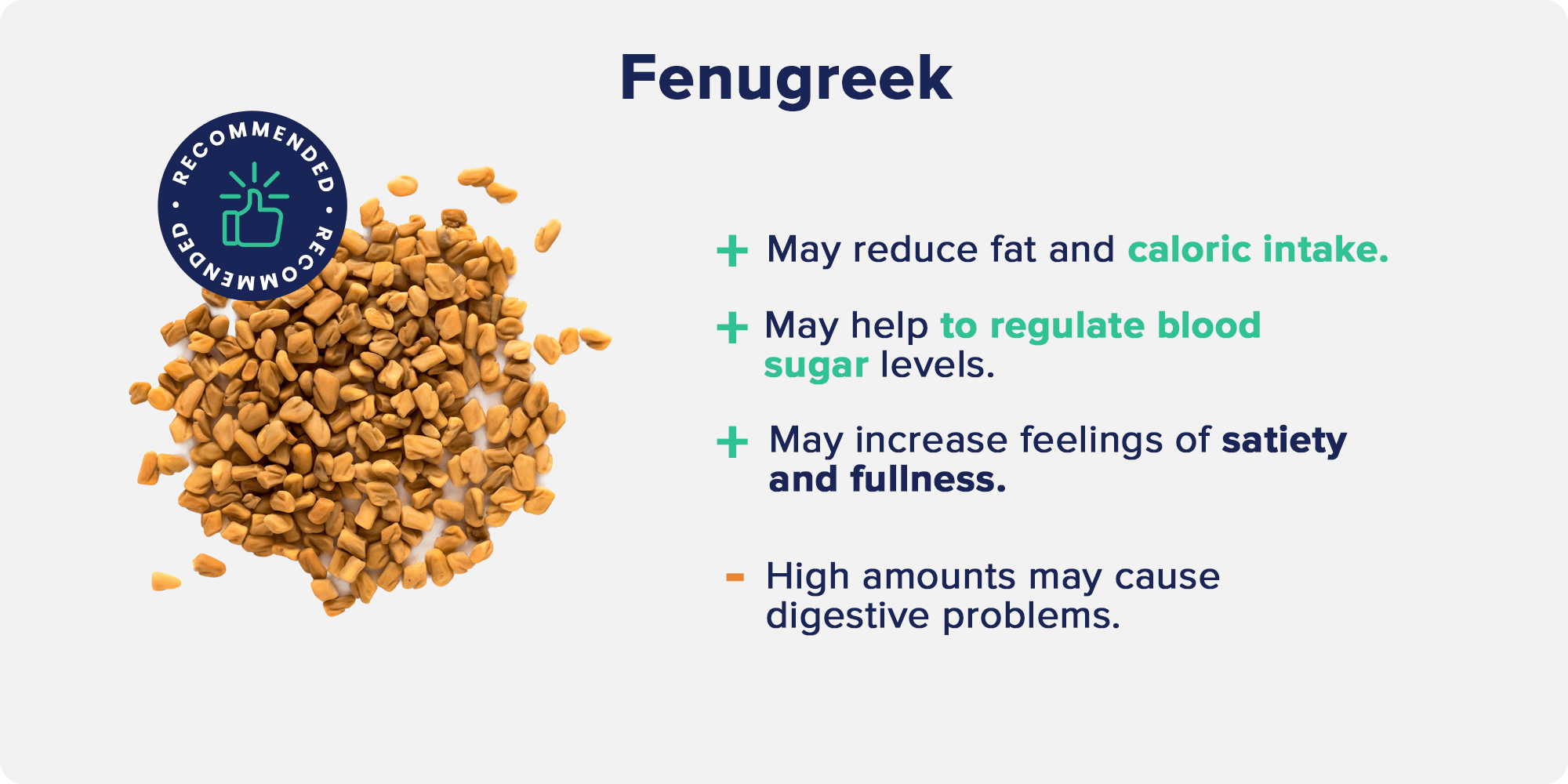
Fenugreek is a clover-like herb whose seeds have been used therapeutically for centuries.
Like many seeds, fenugreek is rich in fiber—both insoluble and soluble, including glucomannan.
Due to its high fiber content, fenugreek seeds are thought to control appetite, help with weight loss, and regulate blood sugar.
Fenugreek suppresses appetite by slowing gastric emptying and delaying how quickly we absorb carbohydrates and fats.
In a small study of 18 people with obesity, consuming 8g of fenugreek fiber significantly increased ratings of satiety and fullness and reduced hunger scores and energy intake at the next meal.
Another study of 12 healthy men found that taking 1.2g of fenugreek seed extract reduced daily fat and caloric intake by 17% and 12%, respectively.
Fenugreek seeds are considered safe with no side effects, but large amounts may cause digestive problems.
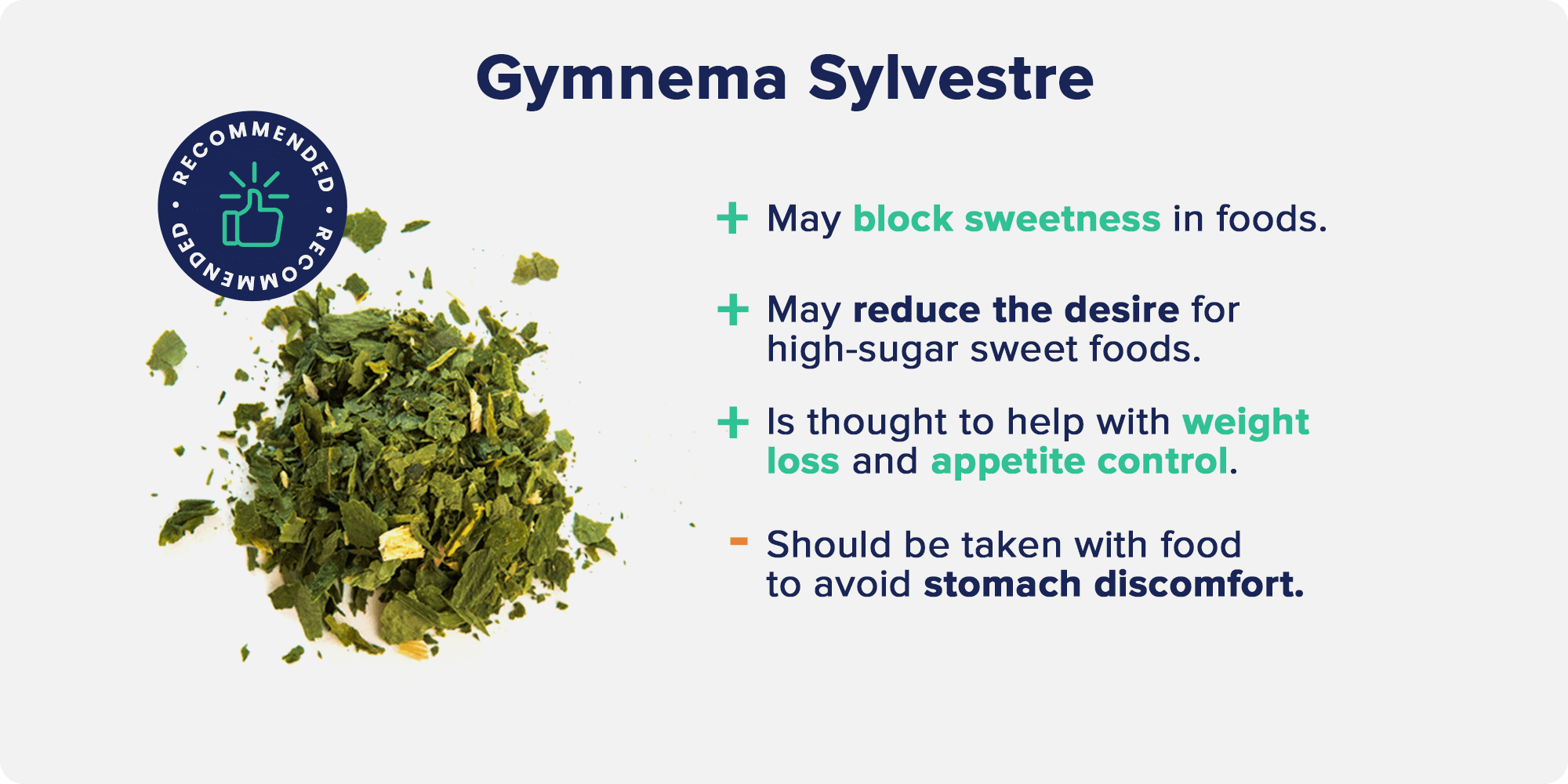
Gymnema sylvestre is a woody vine used historically in Ayurvedic medicine.
Although it’s most often studied for its anti-diabetic and blood sugar-lowering properties, it also is thought to help with weight loss and appetite control.
The active compounds in Gymnema sylvestre are gymnemic acids, which block the sweetness in foods.
As you can imagine, candy or cookies without a sweet taste quickly lose their appeal, helping to reduce sugar or carbohydrate intake.
One study examined how eating Gymnema sylvestre-containing mints affected people’s appetite for their favorite chocolate bars.
The researchers found that the number of chocolate bars eaten decreased by 21% (0.48 fewer bars) within 15 minutes after consuming the Gymnema sylvestre-containing mints.
Plus, the participants’ desire to eat more high-sugar sweet foods was diminished, and they reported reductions in the “pleasantness” of the chocolate (how sad!).
Gymnema sylvestre is considered safe, but it should be taken with food as stomach discomfort can occur otherwise.
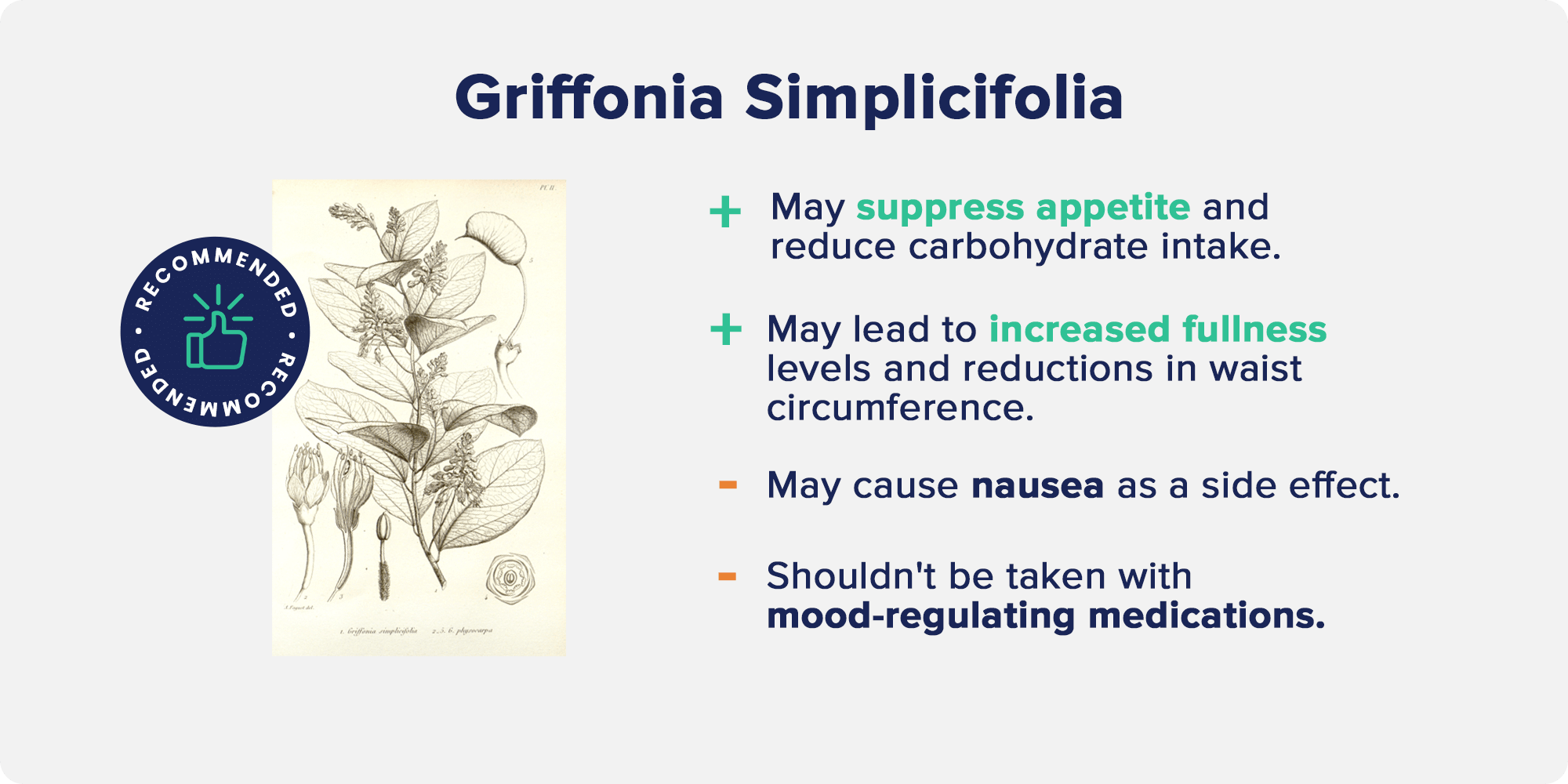
Griffonia simplicifolia is a plant that is the richest natural source of 5-HTP, a compound that gets converted into serotonin in the brain.
As mentioned, serotonin has been shown to suppress appetite and reduce carbohydrate intake.
A small study of 20 overweight women found that those who supplemented with Griffonia simplicifolia extract for four weeks had significant increases in fullness levels and reductions in arm and waist circumference.
Similarly, research with 27 overweight women who took supplemental 5-HTP for eight weeks had a lower appetite, increased fullness, and more significant weight loss compared to those taking a placebo.
However, 5-HTP or Griffonia simplicifolia supplements can cause nausea, and it’s important to know that people taking antidepressants or other mood-regulating medications cannot take 5-HTP or Griffonia simplicifolia.
Although this is not a supplement, eating more protein and fiber in food is the most natural and effective way to suppress appetite—without taking pills or powders.
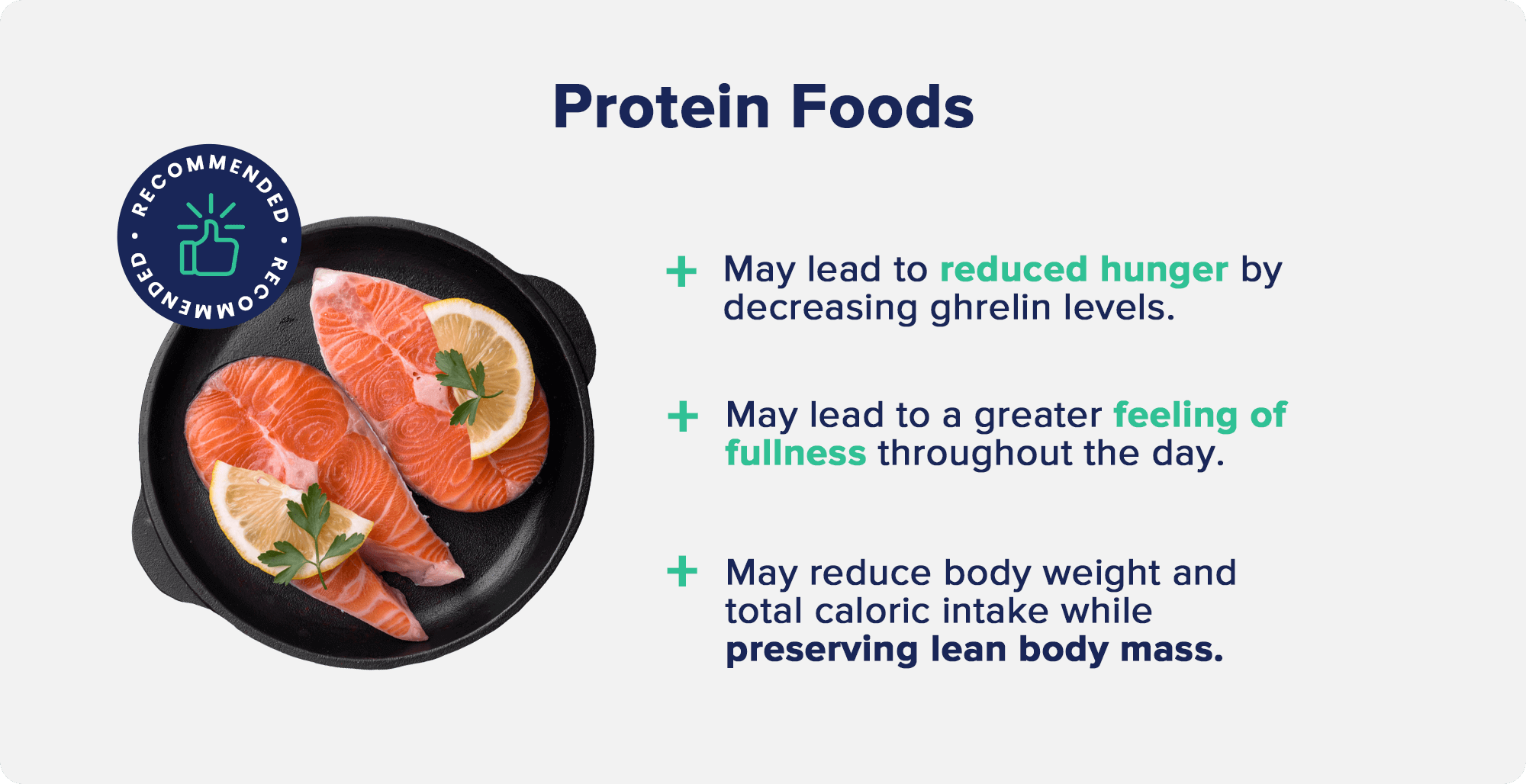
Protein consumption can reduce ghrelin levels and increase the activity of appetite-regulating proteins called peptide YY (PYY), which has been linked to appetite suppression.
High-protein diets (ranging from 1.1-1.6g/kg/day) have been found to reduce body weight and total caloric intake while preserving lean body mass.
Research with healthy men showed that higher protein intake (25% of calories from protein) led to greater daily fullness and peptide YY levels compared to when they ate 14% of calories from protein.
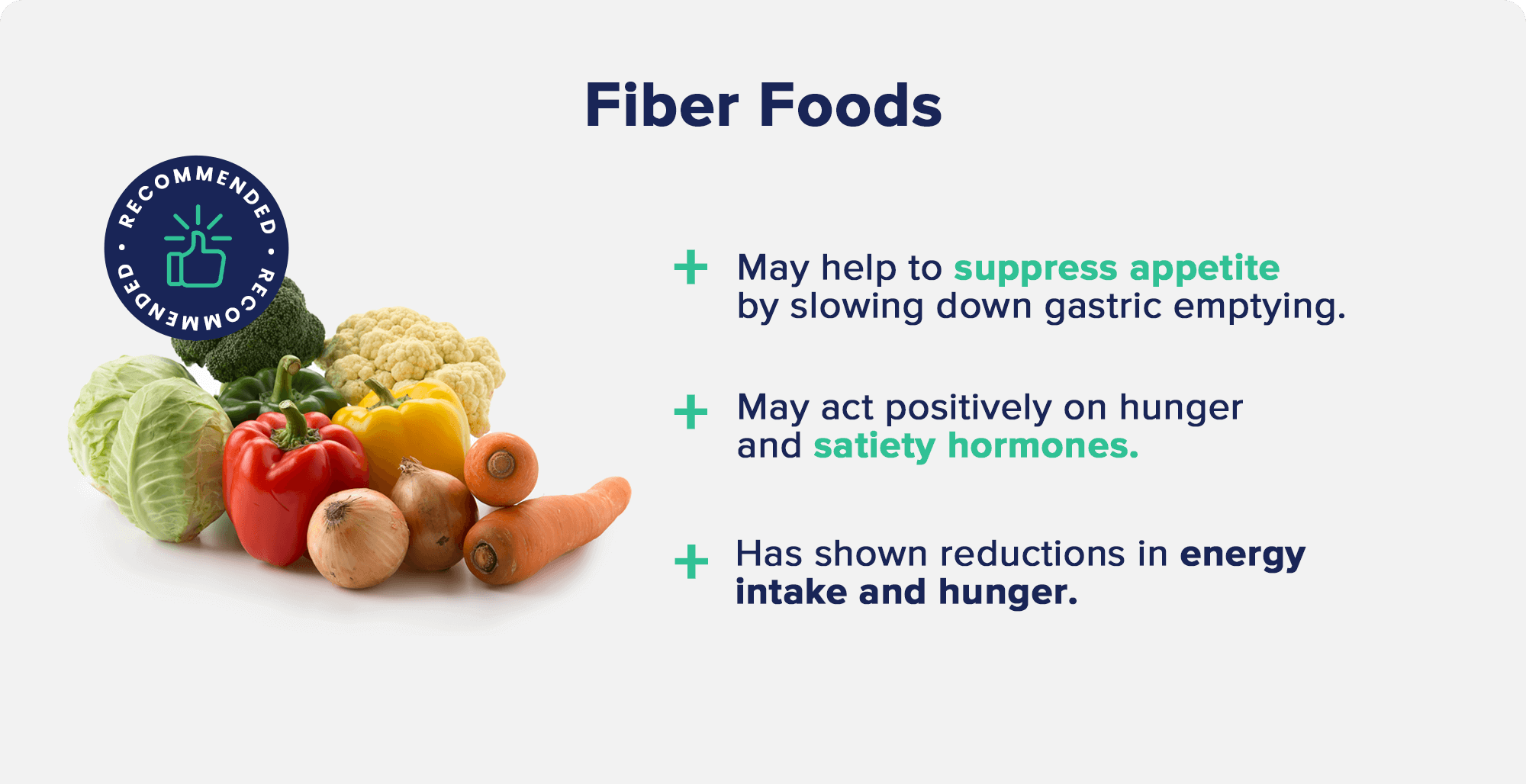
Fiber also suppresses appetite by slowing gastric emptying and creating a physical fullness in the gut because the body does not absorb it.
Consuming fiber can also act positively on hunger and satiety hormones, including peptide YY, cholecystokinin (CCK), and glucagon-like peptide-1 (GLP-1).
Some research has shown reductions in energy intake and hunger following the consumption of fibers, although not all have been conclusive.
Some appetite suppressants include the following compounds, which research indicates may do more harm than good.
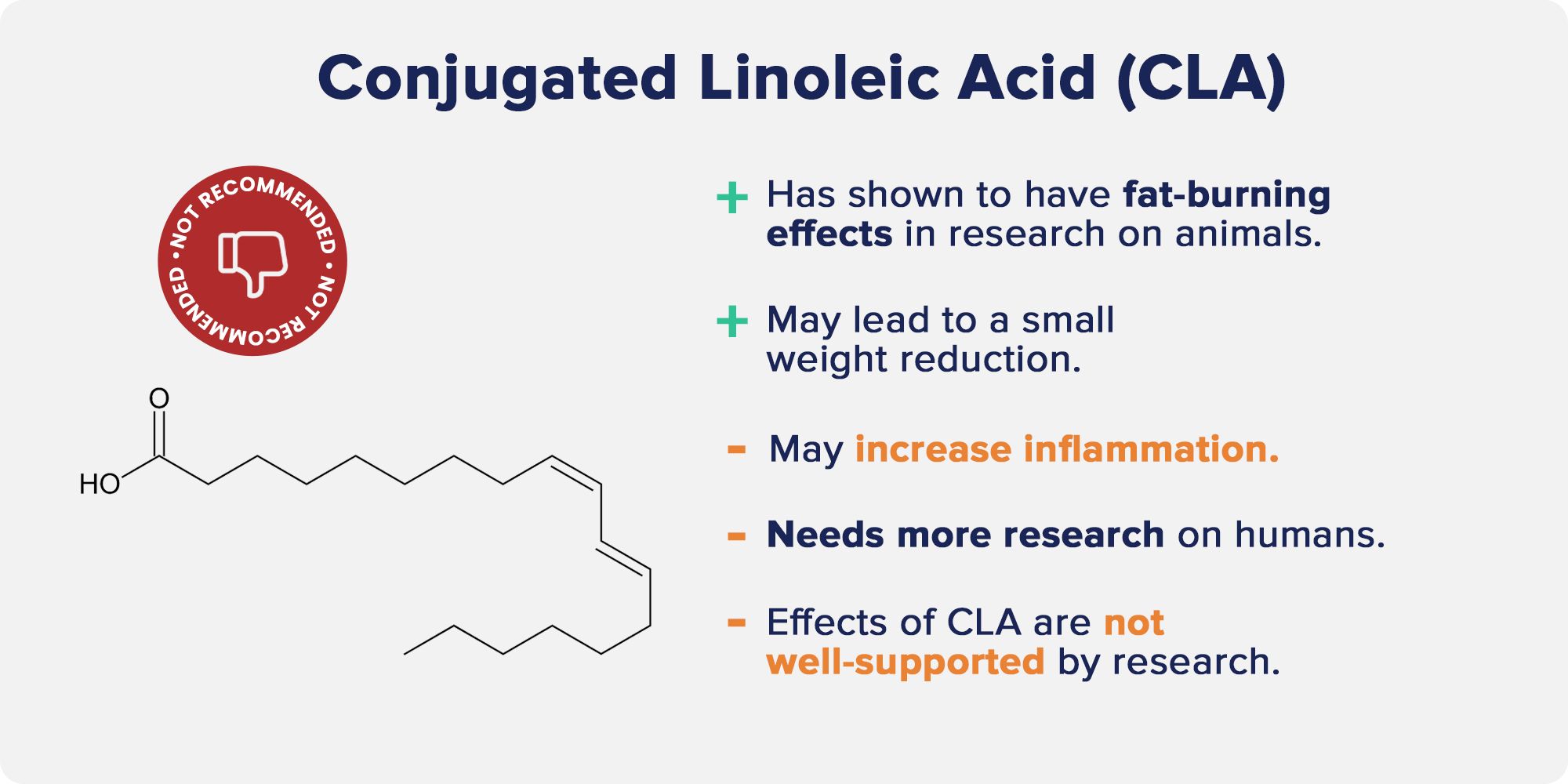
CLA is a naturally occurring fatty acid found in meat and dairy products.
It’s used in some weight loss or appetite-suppressing supplements because research with animals has found it to have fat-burning effects.
However, research on humans has been inconclusive.
In a review of 18 human studies, supplementing with an average of 3.2g of CLA per day led to small weight reductions of 0.11 pounds per week compared to the placebos.
However, this amount of weight loss is negligible, adding up to about one-half of a pound per month.
Plus, there is no evidence suggesting that CLA suppresses appetite.
While most research does not show adverse side effects from CLA, some studies showed that it increases C-reactive protein (CRP), a marker of inflammation.
Overall, the research does not support CLA as an appetite-suppressing supplement, and it may increase inflammatory markers when taken in supplemental form.
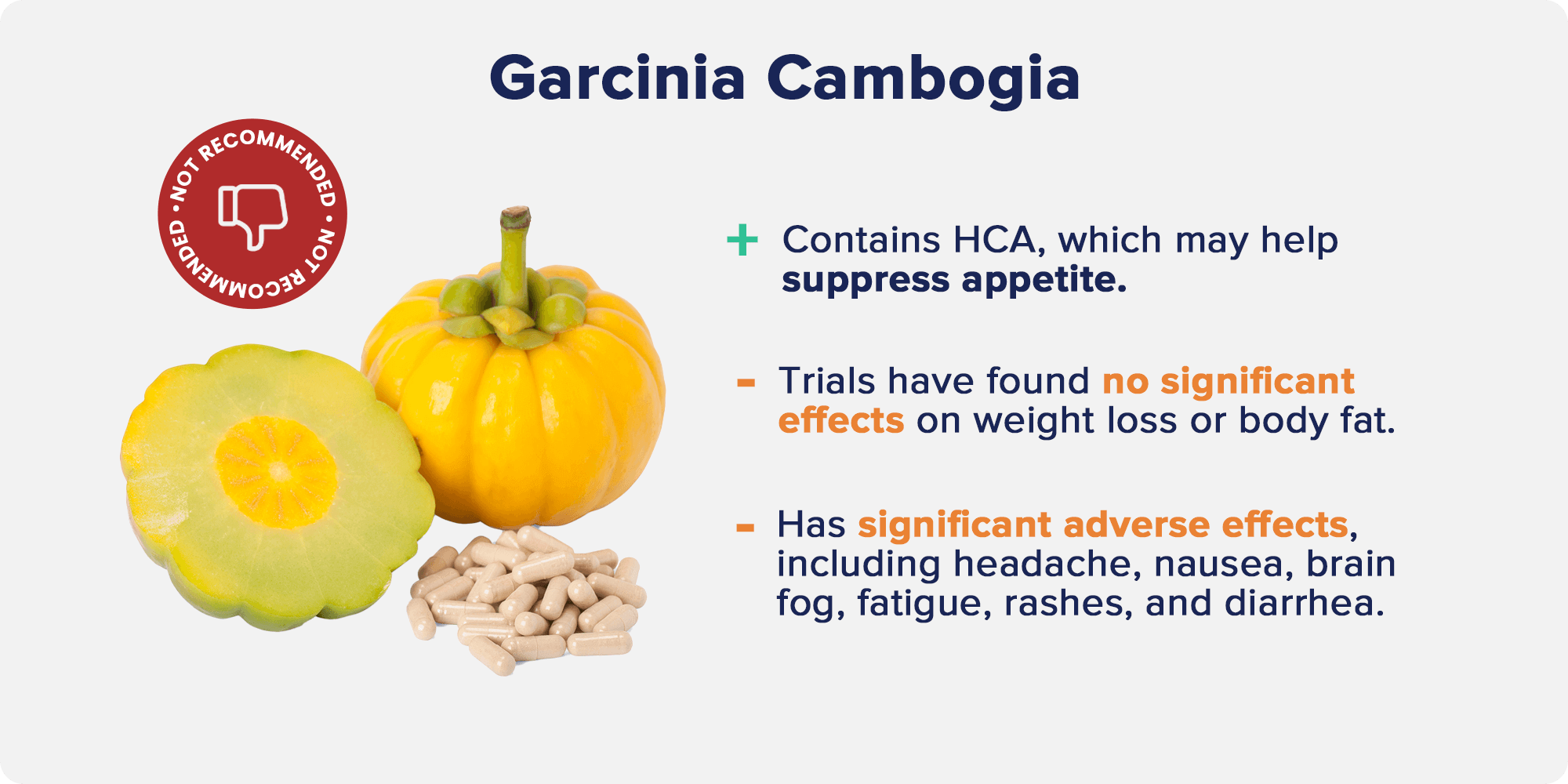
Garcinia cambogia is a plant native to India and Southeast Asia.
The fruit’s rind contains a chemical called hydroxycitric acid (HCA), which has been studied for its effect on appetite suppression.
In animal studies, HCA suppressed de novo lipogenesis (fat cell growth) and reduced body weight.
Several trials have examined the effects of supplemental Garcinia cambogia supplements on body weight and fat, but the results are conflicting.
In a 2020 meta-analysis of eight trials including 530 participants, researchers concluded that Garcinia cambogia significantly reduced body weight by 2.95 pounds and fat mass by 0.42% compared to a placebo.
However, another randomized controlled trial published in the reputable medical journal JAMA found that Garcinia cambogia supplements failed to affect weight loss or body fat.
Although Garcinia cambogia may produce modest weight loss and appetite suppression, the potential adverse effects are common and significant.
Side effects of Garcinia cambogia include headache, nausea, brain fog, fatigue, rashes, diarrhea, and other gastrointestinal symptoms—plus, high doses can cause liver damage.
By eating!
Jokes aside, eating high-protein, high-fiber foods will quickly suppress your appetite.
There is no quick fix for weight loss, and having a balanced diet and exercise routine is the best way to maintain a healthy weight.
Some herbs that have been shown to be safe and suppress appetite include Caralluma fimbriata, fenugreek, and Gymnema sylvestre.
While research hasn’t found that one specific vitamin curbs appetite, it’s known that having vitamin or mineral deficiencies can cause increased cravings.
Therefore, ensuring adequate intake of all essential vitamins and minerals may somewhat control appetite.
Anecdotal evidence reports that people feel less hungry when drinking apple cider vinegar before meals—but that could be because it’s typically mixed with water, which increases feelings of fullness.
Another study found that drinking vinegar before meals promoted feeling fuller after eating—but only because it caused nausea.
Akhlaghi M. The role of dietary fibers in regulating appetite, an overview of mechanisms and weight consequences. Crit Rev Food Sci Nutr. 2022;1-12. doi:10.1080/10408398.2022.2130160
Chearskul S, Kriengsinyos W, Kooptiwut S, et al. Immediate and long-term effects of glucomannan on total ghrelin and leptin in type 2 diabetes mellitus. Diabetes Res Clin Pract. 2009;83(2):e40-e42. doi:10.1016/j.diabres.2008.11.014
Chen IJ, Liu CY, Chiu JP, Hsu CH. Therapeutic effect of high-dose green tea extract on weight reduction: A randomized, double-blind, placebo-controlled clinical trial. Clin Nutr. 2016;35(3):592-599. doi:10.1016/j.clnu.2015.05.003
Chevassus H, Molinier N, Costa F, Galtier F, Renard E, Petit P. A fenugreek seed extract selectively reduces spontaneous fat consumption in healthy volunteers. Eur J Clin Pharmacol. 2009;65(12):1175-1178. doi:10.1007/s00228-009-0733-5
Griggs JL, Su XQ, Mathai ML. Caralluma Fimbriata Supplementation Improves the Appetite Behavior of Children and Adolescents with Prader-Willi Syndrome. N Am J Med Sci. 2015;7(11):509-516. doi:10.4103/1947-2714.170611
Kaats GR, Bagchi D, Preuss HG. Konjac Glucomannan Dietary Supplementation Causes Significant Fat Loss in Compliant Overweight Adults. J Am Coll Nutr. 2015;1-7. doi:10.1080/07315724.2015.1009194
Kuriyan R, Raj T, Srinivas SK, Vaz M, Rajendran R, Kurpad AV. Effect of Caralluma fimbriata extract on appetite, food intake and anthropometry in adult Indian men and women. Appetite. 2007;48(3):338-344. doi:10.1016/j.appet.2006.09.013
Leidy HJ, Armstrong CL, Tang M, Mattes RD, Campbell WW. The influence of higher protein intake and greater eating frequency on appetite control in overweight and obese men. Obesity (Silver Spring). 2010;18(9):1725-1732. doi:10.1038/oby.2010.45
Leidy HJ, Carnell NS, Mattes RD, Campbell WW. Higher protein intake preserves lean mass and satiety with weight loss in pre-obese and obese women. Obesity (Silver Spring). 2007;15(2):421-429. doi:10.1038/oby.2007.531
Mathern JR, Raatz SK, Thomas W, Slavin JL. Effect of fenugreek fiber on satiety, blood glucose and insulin response and energy intake in obese subjects. Phytother Res. 2009;23(11):1543-1548. doi:10.1002/ptr.2795
Panek-Shirley LM, DeNysschen C, O’Brien E, Temple JL. Caffeine Transiently Affects Food Intake at Breakfast. J Acad Nutr Diet. 2018;118(10):1832-1843. doi:10.1016/j.jand.2018.05.015
Patterson M, Bloom SR, Gardiner JV. Ghrelin and appetite control in humans–potential application in the treatment of obesity. Peptides. 2011;32(11):2290-2294. doi:10.1016/j.peptides.2011.07.021
Rondanelli M, Klersy C, Iadarola P, Monteferrario F, Opizzi A. Satiety and amino-acid profile in overweight women after a new treatment using a natural plant extract sublingual spray formulation. Int J Obes (Lond). 2009;33(10):1174-1182. doi:10.1038/ijo.2009.155
Rondanelli M, Opizzi A, Faliva M, Bucci M, Perna S. Relationship between the absorption of 5-hydroxytryptophan from an integrated diet, by means of Griffonia simplicifolia extract, and the effect on satiety in overweight females after oral spray administration. Eat Weight Disord. 2012;17(1):e22-e28. doi:10.3275/8165
Schubert MM, Irwin C, Seay RF, Clarke HE, Allegro D, Desbrow B. Caffeine, coffee, and appetite control: a review. Int J Food Sci Nutr. 2017;68(8):901-912. doi:10.1080/09637486.2017.1320537
Turner S, Diako C, Kruger R, et al. Consuming Gymnema sylvestre Reduces the Desire for High-Sugar Sweet Foods. Nutrients. 2020;12(4):1046. Published 2020 Apr 10. doi:10.3390/nu12041046